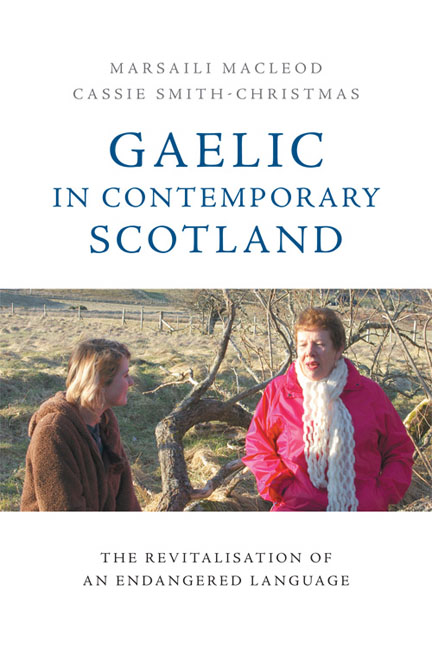Book contents
- Frontmatter
- Contents
- List of Figures
- List of Tables
- Notes on Contributors
- Foreword: Assailed yet Resolute
- Acknowledgements
- List of Abbreviations
- 1 Introduction
- 2 The Language of the Playground: Activists Building Consensus on the Language Policy and Ethos of a New Gaelic Immersion School
- 3 Mismatches between National and Local Gaelic Development: Cròileagan Dùn Èideann and the Promotion of Gaelic-medium Education
- 4 Gaelic amongst Schoolchildren: Ideas on Language Change and Linguistic Choices in Gaelic
- 5 When School is Over and Done With: Linguistic Practices and Sociodemographic Profiles of Gaelic-medium Educated Adults
- 6 New Speakers of Gaelic: A Historical and Policy Perspective
- 7 Learning Gaelic in Adulthood: Second Language Learning in Minority Language Contexts
- 8 Dlùth is Inneach: Charting Language Ideology in the Contemporary Gaelic World
- 9 Gaelic Language Use in Public Domains
- 10 Planning for Growth: The Professionalisation of the Taskforce for Gaelic Revitalisation
- 11 Organisational Language Planning: Gaelic Language Plans in the Public Sector
- 12 The Future of Gaelic Language Revitalisation in Scotland
- Index
5 - When School is Over and Done With: Linguistic Practices and Sociodemographic Profiles of Gaelic-medium Educated Adults
Published online by Cambridge University Press: 18 December 2019
- Frontmatter
- Contents
- List of Figures
- List of Tables
- Notes on Contributors
- Foreword: Assailed yet Resolute
- Acknowledgements
- List of Abbreviations
- 1 Introduction
- 2 The Language of the Playground: Activists Building Consensus on the Language Policy and Ethos of a New Gaelic Immersion School
- 3 Mismatches between National and Local Gaelic Development: Cròileagan Dùn Èideann and the Promotion of Gaelic-medium Education
- 4 Gaelic amongst Schoolchildren: Ideas on Language Change and Linguistic Choices in Gaelic
- 5 When School is Over and Done With: Linguistic Practices and Sociodemographic Profiles of Gaelic-medium Educated Adults
- 6 New Speakers of Gaelic: A Historical and Policy Perspective
- 7 Learning Gaelic in Adulthood: Second Language Learning in Minority Language Contexts
- 8 Dlùth is Inneach: Charting Language Ideology in the Contemporary Gaelic World
- 9 Gaelic Language Use in Public Domains
- 10 Planning for Growth: The Professionalisation of the Taskforce for Gaelic Revitalisation
- 11 Organisational Language Planning: Gaelic Language Plans in the Public Sector
- 12 The Future of Gaelic Language Revitalisation in Scotland
- Index
Summary
Introduction
This chapter presents data from doctoral research conducted by the author, which examined language use and ideologies among a purposive sample of 130 adults who started in Gaelic-medium education (henceforth ‘GME’) during the first years of its availability in Scotland (Dunmore 2015). As part of this research an online survey of language use and attitudes among this group elicited 112 responses between 2011 and 2013. Twenty-eight of these participants were also interviewed, as were eighteen further individuals. Qualitative and quantitative analyses demonstrated that the major-ity of participants’ social use of Gaelic is limited today, although notable exceptions were found among some speakers who were substantially socialised in the language at home during childhood. Only a small minority of participants may be described as ‘new speakers’ of Gaelic, that is to say having been raised without Gaelic at home and acquiring the language in GME, but continuing to make frequent use of it in the present day (see McLeod et al. 2014; Dunmore 2018). This chapter focuses specifi-cally on the degree to which questionnaire participants reported using the Gaelic lan-guage in the work, home and community environments, before moving on to examine the sociological and educational correlates of these professed language practices statis-tically. As I hope to demonstrate, the question of former-GME students’ socialisation in Gaelic at home during childhood appears from the quantitative analysis to have an important bearing on rates of Gaelic language use with various interlocutors in adult-hood. Similarly, continuation with GME after completion of primary school seems from the statistical analysis to play a crucial role, correlating consistently with higher rates of Gaelic use.
Gaelic in Scotland in the early twenty-first century
The 2011 Census in the UK showed a 2.2 per cent decline in the number of people claiming an ability to speak Gaelic in Scotland compared to the 2001 Census. In spite of this, the census also showed growth, for the first time, in the number of Gaelic speakers under the age of twenty. Although the proportion of individuals in this group able to speak Gaelic increased by just 0.1 per cent compared to the figure in 2001, the actual increase in numbers of speakers under twenty-five grew by 8.6 per cent from 2001 (National Records of Scotland (NRS) 2015: 9).
- Type
- Chapter
- Information
- Gaelic in Contemporary ScotlandThe Revitalisation of an Endangered Language, pp. 62 - 78Publisher: Edinburgh University PressPrint publication year: 2018



